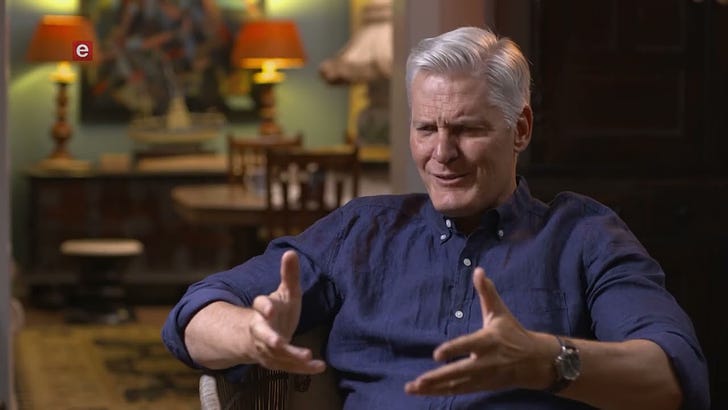Live Wires 2: How running a power utility is like Pulp Fiction + 5 more
Also: Money-laundering trouble, Russian nuclear market dominance, Guyana’s gas boom, Dick Durbin’s happy bikes, and the compelling case for geothermal everywhere.
Live Wires is my occasional short roundup of what I’m reading/watching/thinking. LMK what you think. 🤔😀🤬
1. Must-see TV: The Eskom CEO interview is a political thriller
A bunch of people sent me the TV interview with the outgoing CEO of South Africa’s electricity utility Eskom all saying, “you gotta watch this!” They weren’t wrong. It’s both riveting and depressing. (The show’s outro music even sounds a lot like the theme from HBO’s Succession.)
Andre de Ruyter recounts his poisoning by cyanide, sabotage and protection rackets, and endless procurement scams. He also alleges links between organized crime rings and top politicians, a charge that got him immediately fired, although after he’d already resigned.
Beyond the pure entertainment value (and I know a few things about political thrillers), this matters to South Africans because the problems at Eskom – with rolling outages of up to 10-hours per day – are crushing the economy and killing jobs. For those following global climate policy, South Africa was the first to negotiate a “just energy transition partnership,” an $8.5bn package to speed up the transition from coal to clean energy. And what’s at the heart of the deal? Eskom.
2. The Energy-Money laundering link in South Africa and Nigeria
Speaking of bad governance, both South Africa and Nigeria were recently gray-listed by the Financial Action Task Force, a watchdog for terrorist finance and money laundering. The FATF was originally built by governments to squeeze Al-Qaeda’s moneymen but has since built a powerful set of tools to attack organized crime and fraud. The gray-listing is an embarrassing signal of growing risk. In practice, it could lead to higher interest rates and, per an IMF study, a decline in private investment. The law firm White & Case have a useful explainer. Two quick thoughts from me:
Ugh. Another obstacle to the energy transition. So many headwinds for energy investment in these economies and I just wrote last week about the massive electricity challenges facing the new Nigerian president. So throw this on the pile too.
International shaming can create incentives for reform… maybe again. When Nigeria was black-listed by the FATF back in the early 2000s, the country’s intrepid anti-corruption czar Nuhu Ribadu was able to leverage it to build a capable investigative machine that, after tackling counterfeiting and money laundering, was turned against corrupt governors. It worked. At least it did until his digging got too close to [well, take a guess] and he was forced into exile. Ribadu’s story, captured in the quick-read memoir “Show Me The Money,” is fascinating. The lessons could be relevant again.
3. Russia’s invasion of Ukraine might help get the US moving on nuclear
Bloomberg’s “Russia’s Grip on Nuclear-Power Trade Is Only Getting Stronger” explains that Moscow’s market share dominance:
…is made easier by a dearth of competition. Russia continued investing in nuclear-fuel and technology manufacturing after the Soviet Union collapsed, even as the industry atrophied in other parts of the world.
Sad but true. Fortunately, a raft of next generation advanced nuclear designs are coming to market soon, with plenty of promising US models that should be especially attractive in emerging markets who want small and safer nuclear power.
But the US government is not quite ready to compete with the Russians (or Chinese) who aggressively market their reactors with package deals neatly bundled with cheap finance. The US Development Finance Corporation lifted an outright ban on nuclear financing in 2020, at least. But future buyers of US reactors will have to wade through a maze of regulatory and financing support spread across multiple agencies. American models may have advantages, but we don’t sell them in a convenient package.
My colleague Jake Kincer explains the current opportunity for the US, while our friends at Third Way make a strong case for how the US can accelerate exports. Russia’s invasion has of course been devastating to poor countries because of spiking energy & food prices. But there might be an eventual silver lining if the conflict motivates the US government to finally get its advanced nuclear export act together.🤞
4. Guyana’s gas opportunity?
Guyana already hit the oil lottery and now, Reuters reports, the country of just 800,000 people sees natural gas as the next frontier. Lots of big challenges ahead, but here’s a devastating fact: Guyana has the most expensive and least reliable electricity in all of South America. That’s why IMO a priority must be leveraging any gas boom into (what else?) cheap and reliable power. Quality low-cost electricity is one way to directly share the benefits with everyone and it can help to blunt the macroeconomic effects of a resource boom that will likely lay waste to all other sectors of the economy.
FWIW, another way to avoid the worst of the oil curse is one of my favorite wacky ideas: a citizen dividend. You can read the book (free PDF) or watch me goofily explain with jelly beans.
5. The poor can leapfrog cargo ships with… sustainable bicycles? 🤔
I like to joke that solving energy poverty with solar lanterns is like solving global transportation with bicycles. Bikes are cheap, clean, and fun. All true. So who needs planes, trucks, or cargo ships, amirite?
Well, somehow I missed that Senator Dick Durbin did introduce a Bicycles For Rural African Transport Act (hat tip: Charles Kenny.) Before I get hate mail, I’m sure the program is fine and someone in need is benefiting from it. But it’s obviously not a serious solution to mobility in poor countries. (And if the project is for “sustainable bicycles,” what exactly are unsustainable bicycles?)
6. My favorite TED Talk in a long while: Jamie Beard on “geothermal everywhere”
Enjoy.
[Embed seems not to be working, so try this link.]






